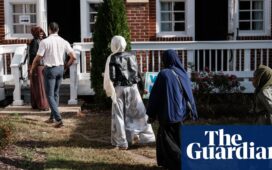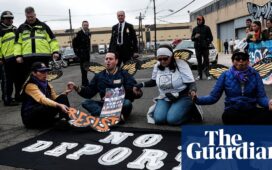Last month, California made headlines when it announced a first-in-the-nation plan to create a $125m coronavirus relief fund for undocumented workers. But its rollout got off to a chaotic start this week, with thousands of calls flooding phone lines, creating huge delays, and so many visitors to the official website that it crashed for hours.
Adding to already overwhelmed telephone systems, the state issued last-minute directives that said callers needed to reach a live person in order to apply for aid.
Nonprofits across the state selected to distribute the money reported huge demand as people rushed to secure a spot for the first-come, first-served program.
The Coalition for Humane Immigrant Rights of Los Angeles, or Chirla, one of 12 nonprofits tapped by the state to distribute the funds, received more than 1.1m phone calls on day one of the program – 630,000 calls just within the first 90 minutes of opening the hotline.
Day 1 of the #DRAI project, CHIRLA worked to ensure 668 residents in LA and Orange County got on their way to receive the #coronavirus aid they desperately need. Not letting the 1,137,000 calls or the 6 million website visits stop us. Call (213-201-8700 or 213-395-9547) ✊? pic.twitter.com/74X6sXo73Q
— CHIRLA (@CHIRLA) May 19, 2020
“We knew the number of applicants would be high, but we were just overwhelmed,” Chirla’s executive director told the New York Times.
Lucas Zucker, the policy and communications director for a nonprofit northwest of Los Angeles that advocates for social and environmental justice, wrote on Twitter that the program’s rocky rollout was predictable.
“Websites and phone lines across the state crashed. Our team saw so much frustration, anger and sadness from folks just trying to feed their kids. The need here is way too large to be met with a one-time disaster relief fund. We’re putting a Band-Aid on an open chest wound,” wrote Zucker.
I’ll be honest: the opening day of the immigrant disaster relief fund was the nightmare we all knew was coming.
— Lucas Zucker (@LucasZucker) May 19, 2020
Jason Montiel, a spokesman for the state’s department of social services, confirmed that the website was down for two and a half hours on Monday morning.
The relief fund totals $125m , $75m of which would come from taxpayer money and $50m from private donors and philanthropic organizations.
“Every Californian, including our undocumented neighbors and friends, should know that California is here to support them during this crisis,” California’s governor Gavin Newsom said in April when he announced the program.
Undocumented immigrants make up an estimated 10% of the state’s workforce. In order to be eligible for the funds, applicants have to show they don’t qualify for federal assistance programs such as the Cares Act or federal unemployment benefits. They also have to demonstrate they’ve suffered financial hardship from the coronavirus pandemic, a task that can be difficult for families who lack access to devices or the internet.
Groups have challenged the legality of the program, arguing the program violates the state’s constitution because “it is giving out taxpayer dollars through non-government entities”. The cases were dismissed by the court.
From the outset, officials acknowledged $125m wouldn’t be enough to reach all families in need. The program is expected to provide $500 per person or $1,000 to households and benefit about 150,000 families – a fraction of the estimated 2 million undocumented immigrants living in California.
Ana Padilla, the executive director of UC Merced’s Community and Labor Center, told the Fresno Bee the available funds are expected to evaporate “very quickly”.
Initially, the state told those seeking benefits that they could leave information in a voicemail when they call to apply if they didn’t connect with a representative.
Early Tuesday, however, Jewish Family Service, a nonprofit picked to distribute funds to undocumented workers in the San Diego area, posted on its Facebook page new guidance from the state: callers must reach a live person.
“The State of California is requiring that all calls to the Disaster Relief Assistance for Immigrants (DRAI) hotlines must be answered live. There will no longer be a voicemail option. Phone lines are open every day, 7 days per week, 8am to 10pm – increased by one hour. If you do not get through when you call, please keep calling back until you get through. There may be long delays,” the new directive said.
“People have been very anxious and desperate for information,” said Christian Arana, the director of policy at the philanthropic Latino Community Foundation (LCF). Even though his organization is not distributing funds, he said phone calls and visitors to the LCF website spiked after the program’s website crashed or callers couldn’t get through.
“It’s like a race to see who can get the money the fastest. People are calling at all hours, wanting to be first in line because they think, ‘If I’m not first, I’m not getting that money’.”
The huge demand speaks to the financial realities for undocumented families.
“Chirla got more than 1.1m phone calls yesterday – and that’s just one organization. That, to me, shows the immensity of need across the state,” Arana said.








